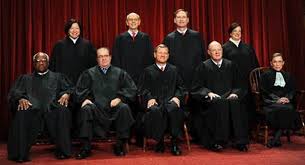
Our American friends are facing the most important decision of their Supreme Court in a generation. Will those 9 unelected judges usurp democratic process by ruling that their 9 votes, and not the votes of millions of citizens in dozens of states that have passed laws and referenda affirming man-woman marriage, shall decide this contentious question?
Here's an educated guess: no, they will not. Like the High Court of Australia, they will agree to differ amongst themselves and agree that such differences on the most intimate institution of society had best be left to the expression of the people's will through democratic debate and legislation.
The audio - genuinely riveting - of the Supreme Court Justices debating this great matter (and the written transcripts) are posted here:
Oral Argument in Obergefell v. Hodges, Question I (Supreme Court of the United States)
Oral Argument in Obergefell v. Hodges, Question II (Supreme Court of the United States)
Here is a summary of the Supreme Court deliberations by a marriage expert from the Sutherland Institute:
And here is another report from the front lines, by a US family group that has status as an 'amicus curiae', or 'friend of the court' in its submission in defence of natural marriage. And above is a comment from a lawyer with the Sutherland institute. This decision will have profound consequences, whichever way it goes, for the defence of natural marriage-and-family here in Australia.
ShareOral Arguments Show the Supreme Court Appears Deeply Divided on Legalizing Homosexual Marriage
Wednesday, April 29, 2015
Yesterday the Supreme Court of the United States heard oral arguments on a case that will result in a landmark decision that will affect all U.S. marriage laws and the future of the family in the United States. Of course, this will have international implications as well.
Although same-sex marriage is currently legal in 37 states, this was forced on the majority of these states through rulings by federal district court judges that were affirmed on appeal. However, one U.S. federal appeals court did uphold the man/woman definition of marriage in the states of Kentucky, Michigan, Ohio, and Tennessee. So the U.S. Supreme Court (SCOTUS) must now resolve these conflicting decisions at the federal circuit court level.
Did you know same-sex marriage was imposed on about two dozen states by the ruling of a single federal judge?
So today SCOTUS considered two specific questions:
- Does the U.S. Constitution require states to legalize homosexual marriage; and
- Does the U.S. Constitution require states, which do not permit homosexuals to marry in their states, to recognize homosexual marriages that are legally performed in another state.
On both issues, the justices seemed deeply divided and considered social, historical, religious and other implications raised by these questions. Most observers believe that the position the justices took during the oral arguments will be the same as their ultimate positions in the written opinion expected by the end of June.Three of the most liberal justices—Ginsberg, Sotomayor and Kagan—appear to have their minds made up that, at a minimum, all states must be required to recognize homosexual marriages performed in another state. It appears they likely also will support a finding that there is a constitutional right for homosexuals to marry each other.
Justice Breyer, usually a liberal, showed he had some reservations about “nine people deciding outside the ballot box” to force same-sex marriage on states that do not want it. He asked, “Why cannot those States at least wait and see whether in fact [same-sex marriage occurring] in the other States is or is not harmful to marriage?” However, he eventually is expected to join the court’s liberal wing as he usually does.
The three reliably conservative justices, Allito, Scalia, and Thomas, seemed unwilling to find a constitutional right to homosexual marriage or to force the states to recognize those same-sex marriages performed in other states. Justice Alito debunked the key argument by one of the attorneys arguing for same-sex marriage that laws limiting marriage to man and a woman are typically based on prejudice and discrimination.
He questioned, “How do you account for the fact that, as far as I'm aware, until the end of the 20th century, there never was a nation or a culture that recognized marriage between two people of the same sex? Now, can we infer from that that those nations and those cultures all thought that there was some rational, practical purpose for defining marriage in that way, or is it your argument that they were all operating independently based solely on irrational stereotypes and prejudice?”
The petitioner’s attorney could not provide a coherent answer.
Justice Alito asked the same attorney: “Suppose we rule in your favor in this case and then after that, a group consisting of two men and two women apply for a marriage license. Would there be any ground for denying them a license?” The responding attorney floundered on her response.
Chief Justice Roberts was harder to read. But in challenging the flat assertion by one of the attorneys arguing that a constitutional right to homosexual marriage would have no impact on heterosexual marriage, Roberts said: “You’re not seeking to join the institution, you’re seeking to change what the institution is. The fundamental core of the institution is the opposite-sex relationship and you want to introduce into it a same-sex relationship.”
As repeatedly recognized by the conservative justices, all the consequences of such a radical redefinition of a fundamental social institution cannot be predicted.
At one point the attorney arguing for same-sex marriage made a statement to the effect that it was settled science that children fare just as well with same-sex couples as they do with heterosexual couples. This statement went unchallenged until Justice Scalia asserted that certainly some of the amicus briefs that were filed “contradicted” that assumption. Our brief certainly fit that mold as it explained to the court the valid social science research showing significant differences in outcomes for children raised by a married heterosexual couple compared to children raised by a married same-sex couple.
Most experts agree that Justice Kennedy will likely be the deciding vote in what most observers believe will be a 5-4 decision by the court, whichever way it rules.
Kennedy was the swing vote in the previous same-sex marriage ruling that struck down a portion of the federal Defense of Marriage Act in 2013. In that decision, however, he stressed the right of the states to define marriage, and he raised that same concern during the oral arguments today. But Kennedy also seemed particularly sympathetic to the demands of homosexuals to be treated “equally.”
More than any other justice, Kennedy seemed torn between the conflicting arguments and could go either way.
If the justices follow normal procedure, they will take an initial vote on the case tomorrow and assign a justice to write the majority opinion, probably Kennedy—no matter what that decision is. The vote is secret, and the final decision is not expected to be handed down until late June.
Two good summaries are here and here.
www.familywatchinternational.org
Follow us


